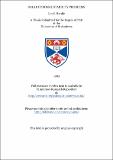Solar coronal stability problems
Abstract
Magnetohydrodynamic stability theory provides a powerful tool for understanding and testing hypothesized mathematical and physical models of observed phenomena on the surface of the Sun. In this thesis, the problem of applying the 'correct' boundary conditions at the photospheric/coronal interface used in modelling coronal arcades is tackled. Then some aspects of the stability of coronal loops and arcades are investigated using a Fourier truncated series approximation for the equation of motion. The problem involving the boundary conditions has been the subject of a controversy for the past decade with two principal conditions suggested, the 'rigid-wall' conditions where all perturbations vanish at the interface, and 'flow-through' conditions where flows parallel to the equilibrium magnetic field take place. By modelling the photosphere and corona as two different density regions and then varying the ratio of the densities of the two regions, growth rates and eigen-functions of both ideal and resistive modes are investigated in order to follow the evolution of the modes as the density ratio is increased. In order to simplify the analysis, the 2-D equations are reduced to 1-D equations by taking a WKB approximation for the spatial variations across the field to give a localized ballooning approach with ordinary differential equations along the fieldlines. Stability of coronal loops to kink modes transformed to localized modes by increasing the poloidal wavenumber, m, is investigated. Two fields generated numerically from the Grad-Shafranov equation and three analytic fields are investigated in detail and the effect of pressure on the marginal loop length is found, both for near force-free conditions such as is found in the solar corona, and away from force-free conditions. It was found that for near force-free conditions, kink modes are the most unstable with localized modes the most stable. As pressure and pressure gradients become important, there is a reversal in the most unstable modes with localized modes the most unstable.
Type
Thesis, PhD Doctor of Philosophy
Collections
Items in the St Andrews Research Repository are protected by copyright, with all rights reserved, unless otherwise indicated.

